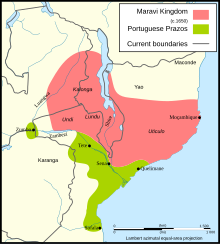This is an old revision of this page, as edited by Dysmorodrepanis~enwiki (talk | contribs) at 22:57, 14 April 2011 (bit copyedit, from Chewa). The present address (URL) is a permanent link to this revision, which may differ significantly from the current revision.
Revision as of 22:57, 14 April 2011 by Dysmorodrepanis~enwiki (talk | contribs) (bit copyedit, from Chewa)(diff) ← Previous revision | Latest revision (diff) | Newer revision → (diff)
Maravi was a state established by the Bantu Chewa people, descendants of the Amaravi, in the area of Lake Malawi, in present-day Malawi, in the 16th century. The present-day name "Malawi" is said to derive from "Maravi" which itself means "fire flames".
At its greatest extent, the state included territory from the Tumbuka and Tonga areas to the north to the Lower Shire in the south, and west to Luangwa and Zambezi valleys. Maravi's rulers belonged to the Phiri matriclan and held the title Kalonga. They ruled from Manthimba, the secular/administrative capital. Meanwhile, the patrilineal Banda clan, which traditionally provided healers and mystics, took care of religious affairs from their capital Mankhamba near Nthakataka.
In the 19th century, the Maravi were frequently raided by their neighbors the Yao and captured for sale as slaves. David Livingstone visited Lake Nyasa in 1859, and Protestant missionaries soon followed.
Maravi peoples speak several dialects, including Chichewa (Malawi’s national language), and speak other official languages: Portuguese in Mozambique and English in Malawi, Zambia, and Zimbabwe.
Today, "Maravi" is also a generic name of the black tribes in Malawi, Zambia, Zimbabwe, and Mozambique.
See also
External links
This African history–related article is a stub. You can help Misplaced Pages by expanding it. |
This Malawi-related article is a stub. You can help Misplaced Pages by expanding it. |
This Mozambique-related article is a stub. You can help Misplaced Pages by expanding it. |